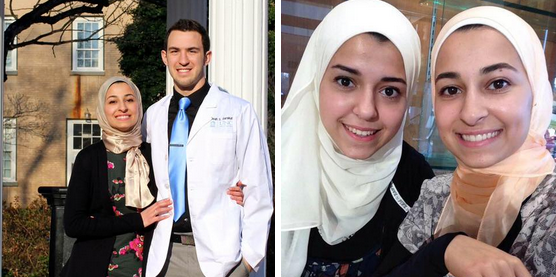The three young Muslim American students were murdered execution style on the night of February 10th, 2015. By now the murders, that of Deah Barakat, Yusor Abu-Salha, and her sister Razan have permeated primetime.
The speed with which the murders took on a myriad of characteristics and motives is a reflection of the shocking and threatening nature of the incident. Was the shooter racially and religiously motivated, or was it merely a squabble over parking space? Did the media take too long to cover the story? Is it wrong to immediately think it was a hate crime? Why did these murders strike such a nerve with me? Maybe it is because my first reaction was that they were racially motivated—maybe not. What is certain though is that the murders felt like an attack on American, and more importantly, human ideals of equality, security, and civility.
I remember vividly the day the Twin Towers were attacked. I remember my mom crying in the living room of our California home. In the days that followed, I remember my father pacing repeatedly saying, “It won’t be the same.”
Not two weeks later, in an address to Congress, President George W. Bush drew the line, “Every nation in every region now has a decision to make. Either you are with us or you are with the terrorists.” With those words came the creation of ‘the other’, a distinct overarching generalization that placed the entirety of a culture and religion into the same pot. The policies, and ensuing sentiment that has grown from the War on Terror has tested the very ideals on which America was founded.
History is littered with the dehumanization of entire populations, a tendency from which America is not immune. Whether it was intentional demonization of African Americans (see Atiba Goff et al., 2008), or the embodiment of the entire Japanese American population as disloyal (see Henrichs, 2011), turning a culture into ‘the other’ has time and time again stained America’s proud history. As a Middle Eastern American, I fear that another shameful stain is threatening to leave an irremovable mark on America’s collective history. The “War on Terror” has taken on a life of its own. Fueled by culturally ignorant policies, and propagandized by talking heads, the American view of terrorism and Islam has engulfed an entire religion and hypnotized Americans from coast to coast.
While policy makes a point to differentiate between radical Islamic groups like the Taliban from Muslims at large, research has repeatedly uncovered biased, and negative attitudes towards Muslims, Muslim-Americans, and Islam in general (see Davis 2007; Liz, 2010; Saeed, 2007). Aggravating an already tense situation, popular media routinely portrays Islam, and its adherents, as an uncivilized, ignorant, and backwards threat to American society.
Simultaneously, American media is void of any positive mention of Muslim accomplishments. This media-endorsed, policy-driven prejudice has created a situation where when “thinking about the War on Terror, Americans may not be envisioning an ill-defined enemy but one clearly identified by religion” (Sides & Gross, 2013).
For a community of growing political, business and social leaders, it is critical to recognise the possibility that an unconscious bias exists within our thought process—one that will innately influence the way we formulate policy, conduct business, and approach society.
By overwhelmingly creating a monolithic Muslim-other through our movies, news, vocabulary, and policy, we as a society err closer and closer to fundamentally negating the same rights we so proudly boast. Regardless of whether the murders were racially motivated, with so many viewing hate as a readily plausible motive, a truly frightening thing has happened—the tacit acceptance of prejudice in our society.
This story was first published in The SAIS Observer, the official student weekly of Johns Hopkins SAIS.







Comments (11)
xcn5bsn5bvtb7sdn5cnvbttecc
[…]just beneath, are various absolutely not connected sites to ours, even so, they are surely really worth going over[…]
ccn2785xdnwdc5bwedsj4wsndb
[…]Here are some of the web pages we advocate for our visitors[…]